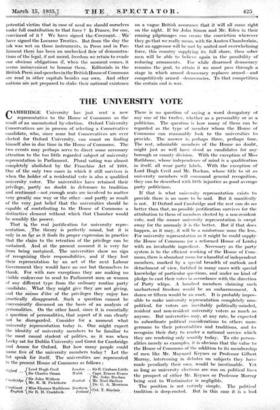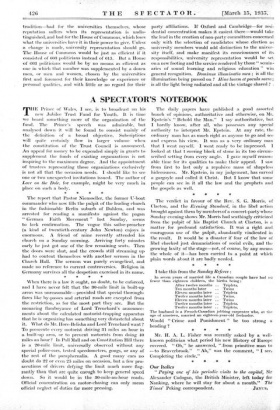THE UNIVERSITY VOTE
CAMBRIDGE University has just sent a new representative to the ,House of Commons as the result of an uncontested -by-election. Oxford University Conservatives are in process of selecting a Conservative candidate, ,who, since none but Conservatives are ever elected for Oxford University, can count on finding himself also in due time in the House of Commons. The two events may perhaps serve to direct some necessary attention to the too little regarded subject: of university representation in Parliament.. Plural voting was almost completely abolished . by. the Franchise Act of 1918. One of the only two cases . in which it still survives is when the ,holder of a residential vote is also a qualified university -voter., The universities have retained their privilege, .p.artly no doubt in deference to . tradition and sentiment—not ,enough .seats are involved to matter very, greatly one , way or the .other—and partly as result of the very. , just belief .that the universities should be capable _of, , contributing to the House of Commons a distinctive element without which that Chamber would be sensibly- the poorer. That 4, the real. justification for -university repre-. sentation. The theory, is perfectly sound, but it is only in so far. as it finds its proper expression, in practice that the claim to the retention of the privilege can be sustained.. An at. the present moment it is very far from being. sustained.. The universities show no sign of recognizing their . responsibilities, and if they lost their , representation by an act of the next Labour Government they would have no one but themselves to thank. For . with rare exceptions they are making no visible endeavour to send .to Parliament men or- women of any different type from the ordinary routine party candidate.. *hat they might give they are not giving, and the .raison d'être of the privileges they enjoy has practically, disappeared. Such a question cannot be conveniently, discussed on the basis of an analysis of personalities. On the other hand, since it is essentially. a question of personalities, that aspect of it can clearly not, be disregarded. Consider for a. moment . what . . _ .
university _representation today is. One might expect the identity of university members. to be familiar to the most Casual student of politics, as it was when Leeky sat for Dublin University and .Gorst for Cambridge and Anson' for Oxford. But how many people could name five of the university members today ? Let the list speak for itself. The ulliVersities are represented in the present House of Commons as follows : Oxford .••{SttiCharles rrLord an i' h Oman London . . Sir E. Graham Little, Welsh . . Capt. Ernest Evans
Mr.' John Buchan .
Cambradge• {Sir- John Withers .Scottish Mr. Noel Skelton
Pickthorn Dr. G. A. Morrison
Combined IMiss Eleanor Ratlibone Northern •
ol. T. Sinelair .
English lSir R. kr. Craddock- Ireland C There is no question -of saying a word derogatory of any one of the twelve, whether as a personality or as a' politician. -The question is how Many of them can be regarded as the type of member whom the House of Commons can reasonably look to the universities to provide. The answer is, perhaps three, perhaps four. The rest, admirable members of the House no doubt, might just as well have stood as candidates for any borough or county division. With the exception of Miss Rathbone, whose independence of mind is a qualification in itself, all wear party labels. • With the exception of Lord Hugh Cecil and Mr. Buchan, whose title to sit as university members will command general recognition, they can be described with little injustice as good average party politicians.
If that is what • university representation exists to provide there is no more to be said. But it manifestly • is not. -If Oxford- and Cambridge and the rest can cici no better than that, no possible justification survives for the attribution to them of members elected by a non-resident vote, and the sooner university representation is swept away for the anomaly- it is the better. But if that does happen, 'as it may, it will be a misfortune none the- less; • For university representation as it might be could supply- the House of Commons (or a reformed House of Lords) with an invaluable ingredient. Necessary ,as the party system is to the efficient working of the House of Corn-. mons, there is abundant room for a handful of independent members, marked by a special breadth of outlook and detachment of view, fortified in many- cases with special knowledge of particular questions, and under no kind of pledge to cast their votes in accordance with, the direction of Party whips. A hundred members claiming such unchartered freedom would be an embarrassment. A. dozen or fifteen would be an asset. It is probably impos- sible to make university representation completely non- political, for voters are inevitably politically-minded, resident and .non-resident university voters as much as anyone. -But universities may; -at- any rate, be expected to subordinate political considerations to others more germane to their potentialities. and traditions, and to recognize -their duty to render a national 'service which they are rendering only scantily today. To cite person alities merely as examples, it is obvious that the value to the -House-of Commons of the addition to its membership of men like Mr. Maynard Keynes or Professor Gilbert Murray, intervening . in debates on subjects they have made- peculiarly their own. would be inestimable. Yet so long. as university elections are run on political lines the prospect of either Mr. Keynes or Professor Murray being sent to Westminster is negligible.
The position is not entirely simple. The political tradition is deep-rooted. But in this case it is a bad tradition—bad for the universities themselves, whose .reputation suffers when its representation is undis- tinguished, and bad for the House of Commons, which loses what the universities have it in their powerto give. Unless a change is made, university representation should go. The House of Commons would be just as efficient • if it consisted of 603 politicians instead of 615. But a House of 603 politicians would be by no means as efficient as one in which that number was supplemented by a dozen men, or men and women, chosen by the universities first and foremost for their knowledge or experience or personal qualities, and with little or no regard for their party affiliations. If Oxford and Cambridge—for resi- dential concentration makes it easiest .therewould take the lead in the creation of non-party committees concerned only with the selection of candidates whose election as university members would add distinction to the univer- sity itself, and make manifest its consciousness of its responsibilities, university representation would be set on a new footing and the service rendered by those" semin- aries of sound learning and religious education" win general recognition. Dominus illuminati° mea ; is all the illumination being passed on ? Hine lucent et pocula sacra ; is all the light being radiated and all the vintage shared.? .











































 Previous page
Previous page